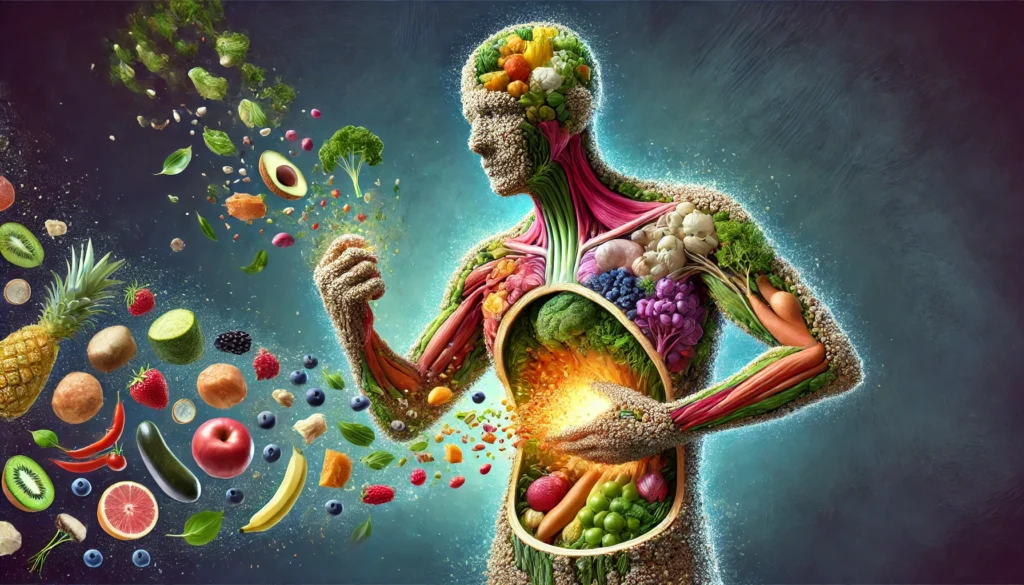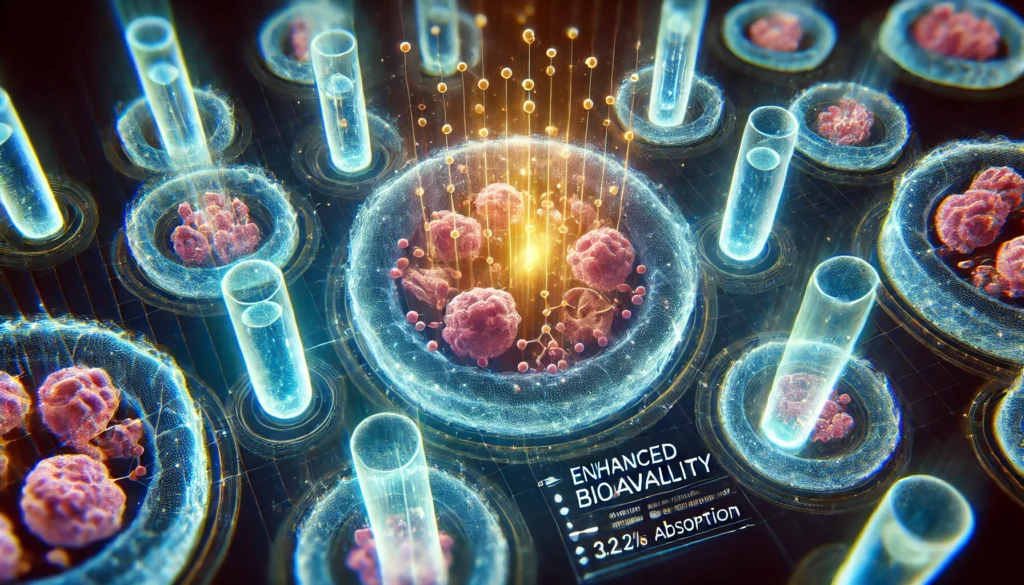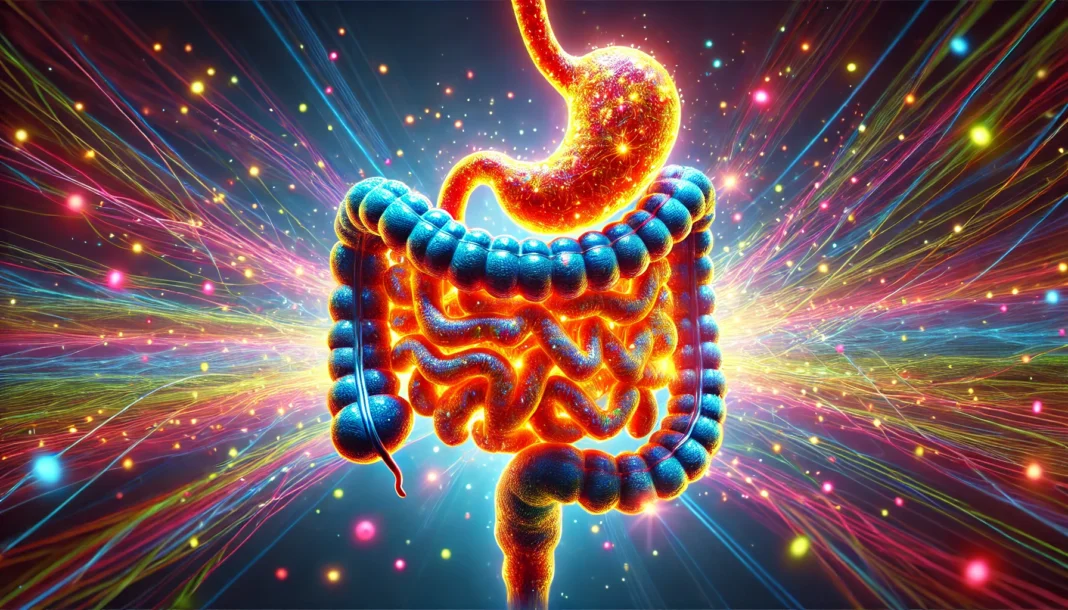The ability of the body to extract and utilize essential vitamins, minerals, and macronutrients from food is fundamental to overall health. Nutrient absorption is not merely about eating a well-balanced diet; it involves optimizing digestion, cellular uptake, and metabolic efficiency. Many factors influence how well the body absorbs nutrients, including gut health, enzyme activity, food pairings, and lifestyle habits. Understanding how to absorb food better requires an integrative approach that encompasses diet, supplementation, and holistic wellness practices. By focusing on methods that enhance absorption, individuals can ensure they receive the full benefits of the nutrients they consume, leading to better energy levels, improved immune function, and overall well-being.
You may also like: The Benefits of Anti Aging Herbs
Understanding Nutrient Absorption and Its Importance
Nutrient absorption is the biological process through which the body assimilates vitamins, minerals, proteins, and fats from food. The efficiency of this process determines overall health outcomes, as it affects energy production, immune support, cognitive function, and cellular repair. When nutrient absorption is compromised, individuals may experience deficiencies, even if they consume a nutrient-rich diet. Defining nutrient absorption helps to recognize that it is a multi-step process beginning in the digestive tract and continuing at the cellular level. Absorption nutrition plays a crucial role in maintaining vitality and longevity, making it essential to optimize for maximum benefit.

Where Does Most Nutrient Absorption Occur?
The majority of nutrient absorption takes place in the small intestine, which serves as the main site of nutrient absorption. Within the small intestine, specialized tissues called villi and microvilli significantly enhance the surface area for nutrient uptake. These structures facilitate the efficient transfer of absorbable nutrients into the bloodstream, ensuring they reach target cells and organs. While some preliminary breakdown occurs in the stomach, are nutrients absorbed in the stomach to a significant extent? The answer is no. The stomach plays a critical role in preparing food for digestion, but most nutrient uptake happens further along the gastrointestinal (GI) tract. Understanding where most nutrient absorption occurs allows individuals to adopt strategies that improve digestive function and maximize nutrient availability.
The Role of Digestive Enzymes in Nutrient Absorption
Digestive enzymes are essential for breaking down food into smaller, absorbable components. Without sufficient enzyme activity, the body struggles to extract key nutrients, leading to poor absorption nutrition. The absorption of nutrients is what tissue efficiency depends on, as enzymes facilitate the breakdown of carbohydrates, proteins, and fats. Enzyme production can decline due to aging, stress, or poor dietary choices, making it necessary to incorporate enzyme-rich foods or supplements. Pineapple, papaya, and fermented foods contain natural enzymes that help optimize digestion and improve nutrient uptake. Ensuring that digestive enzymes are present in adequate amounts can significantly enhance how to improve nutrient absorption.
How to Increase Nutrient Absorption with Food Pairings
Certain food combinations enhance the bioavailability of vitamins and minerals, allowing the body to absorb nutrients better. Fat-soluble vitamins, such as A, D, E, and K, should be taken with meals to enhance absorption by pairing them with healthy fats like avocado or olive oil. Similarly, vitamin C-rich foods, such as citrus fruits, improve iron absorption from plant-based sources like spinach. Pairing turmeric with black pepper increases curcumin absorption, while consuming calcium alongside magnesium supports bone health. Foods that increase nutrient absorption often contain complementary nutrients that work synergistically, ensuring optimal uptake. Being mindful of food pairings allows individuals to enhance the body’s ability to extract essential nutrients efficiently.
Gut Health and Its Impact on Nutrient Absorption
A healthy gut microbiome plays a pivotal role in GI tract absorption of nutrients, influencing how effectively the body processes food. Beneficial gut bacteria aid in the breakdown of fiber, support enzyme function, and contribute to vitamin synthesis. An imbalance in gut flora can result in bloating, poor digestion, and nutrient deficiencies, emphasizing the need to prioritize gut health. Fermented foods, prebiotics, and probiotics promote a balanced gut environment, ensuring that the body absorption process remains efficient. Understanding how gut health affects how to absorb nutrients better provides insight into the importance of maintaining digestive balance for overall wellness.
Hydration and Its Role in Nutrient Absorption
Water is a crucial factor in nutrient absorption, as it helps dissolve vitamins and minerals, making them easier to transport through the bloodstream. The absorption of nutrients is what tissue function depends on, as hydration supports cell membrane permeability and enzymatic reactions. Insufficient water intake can slow digestion and impair how to increase nutrient absorption, leading to suboptimal nutrient utilization. Drinking adequate amounts of water throughout the day, particularly before meals, supports efficient digestion and improves the body’s ability to extract vital nutrients. Proper hydration also contributes to sustained energy throughout the day. Natural strategies for boosting energy often emphasize hydration and nutrient synergy.
The Impact of Stress and Lifestyle on Nutrient Absorption
Chronic stress and poor lifestyle habits can interfere with how your body absorbs nutrients by disrupting digestive processes. High stress levels contribute to the overproduction of cortisol, which negatively affects GI tract absorption of nutrients and impairs enzyme function. Lack of sleep, excessive alcohol consumption, and sedentary behavior further hinder the body’s ability to absorb food better. Engaging in stress-reducing activities such as meditation, yoga, and regular exercise can enhance absorption nutrition by promoting digestive efficiency. Making mindful lifestyle adjustments ensures that the body is in an optimal state to process and utilize nutrients effectively.
Chronic stress and sleep deprivation are also known to disrupt hormonal balance and slow metabolic processes, which can further impair nutrient absorption. Discover strategies on how to revitalize your metabolism and support better nutrient use.
Supplements and Their Role in Enhancing Nutrient Absorption
While whole foods should be the primary source of nutrition, certain supplements can support how to improve vitamin absorption. Probiotic supplements enhance gut flora, aiding in digestion and increasing the bioavailability of essential nutrients. Digestive enzyme supplements can assist those with low enzyme production, improving how to absorb nutrients better. Additionally, certain vitamins and minerals, such as magnesium and B-complex vitamins, may require supplementation to achieve adequate levels. Choosing high-quality, bioavailable supplements ensures that the body can efficiently utilize the nutrients provided, supporting overall well-being.

Frequently Asked Questions (FAQ) on Nutrient Absorption and Diet Optimization
1. How does your body absorb nutrients, and what factors influence this process?
Your body absorbs nutrients primarily through the small intestine, where most nutrient absorption occurs. However, several factors impact the efficiency of this process, including gut health, enzyme production, and dietary composition. The absorption of nutrients is what tissue function depends on, primarily the intestinal villi, which increase surface area for better uptake. Stress, hydration levels, and even sleep patterns influence how effectively your body can absorb food better. In some cases, malabsorption can occur despite a healthy diet due to underlying health conditions. It’s important to identify the root causes of poor nutrient uptake for effective intervention.
2. What helps your body absorb nutrients more effectively?
Improving body absorption requires strategic dietary habits and lifestyle choices. Pairing fat-soluble vitamins with healthy fats enhances their bioavailability, while vitamin C-rich foods improve iron uptake. Chewing food thoroughly breaks it down, making nutrients more accessible for GI tract absorption of nutrients. Hydration also plays a crucial role in how to absorb nutrients better, as water aids in digestion and circulation. Additionally, maintaining a diverse gut microbiome supports efficient absorption of nutrients by optimizing enzyme activity.
3. Are nutrients absorbed in the stomach, or does absorption happen elsewhere?
While some nutrient breakdown begins in the stomach, particularly for proteins and certain minerals, where does most nutrient absorption take place? The answer is the small intestine. The stomach’s acidic environment primarily prepares food for further digestion, but the small intestine is the main site of nutrient absorption. Factors like gut motility and enzyme efficiency determine how well absorbable nutrients reach the bloodstream. If stomach acidity is imbalanced, it can hinder the body’s ability to absorb food better.
4. How to improve vitamin absorption through food pairings?
Certain food combinations can significantly enhance how to improve nutrient absorption. For instance, consuming calcium-rich foods with vitamin D improves calcium uptake, while pairing turmeric with black pepper boosts curcumin absorption. Magnesium aids in vitamin D metabolism, emphasizing the importance of a well-rounded diet. Some vitamins should be taken with meals to enhance absorption, particularly fat-soluble ones like A, D, E, and K. A strategic diet ensures that the body efficiently utilizes all absorbable nutrients.
5. What is the role of gut health in nutrient absorption?
The gut microbiome plays a critical role in how to increase nutrient absorption by breaking down food and aiding in vitamin synthesis. An imbalance in gut bacteria can lead to deficiencies even when dietary intake is adequate. Foods that increase nutrient absorption include fermented items like yogurt, kimchi, and sauerkraut, which support a healthy gut environment. The GI tract absorption of nutrients is heavily influenced by the presence of beneficial bacteria and digestive enzymes. A fiber-rich diet further promotes intestinal health, ensuring optimal nutrient uptake.
6. How does stress impact nutrient absorption?
Chronic stress negatively affects how your body absorbs nutrients by disrupting digestive enzyme production and altering gut motility. Stress can lead to increased inflammation, reducing the efficiency of GI tract absorption of nutrients. Additionally, it may cause an imbalance in stomach acid levels, hindering the breakdown of essential vitamins and minerals. Practicing mindfulness techniques, such as meditation and deep breathing, supports how to absorb nutrients better by promoting digestive health. Prioritizing stress management is a vital aspect of improving absorption nutrition.
7. How can athletes, especially runners, optimize nutrient absorption?
For endurance athletes, understanding how to improve nutrient absorption is crucial for performance and recovery. The keto diet for runners, for example, emphasizes high-fat, moderate-protein intake, which shifts the body toward fat-based fuel utilization. However, keto and running require strategic electrolyte management to avoid imbalances. A keto runner should ensure sufficient intake of magnesium, sodium, and potassium to maintain energy levels. Whether following keto for runners or a traditional high-carb diet, optimizing gut health through probiotic-rich foods enhances overall nutrient uptake.
8. What are the long-term effects of poor nutrient absorption?
Prolonged deficiencies can lead to significant health issues, including weakened immunity, bone loss, and cognitive decline. If the body absorption of essential vitamins and minerals is inadequate, it can impact organ function and metabolic efficiency. Over time, conditions like anemia, osteoporosis, and chronic fatigue may develop due to poor absorption of nutrients. This highlights the importance of prioritizing essential minerals like magnesium, zinc, and calcium, which support metabolic health and disease prevention. Addressing gut health, meal composition, and lifestyle factors is key to sustaining proper nutrient uptake. Understanding what helps your body absorb nutrients ensures long-term vitality and disease prevention.
9. How does meal timing affect nutrient absorption?
When and how you eat can influence how to increase nutrient absorption. Some nutrients should be taken with meals to enhance absorption, while others are better absorbed on an empty stomach. For example, iron is best absorbed when taken without dairy, while B vitamins work well in the morning for energy metabolism. Intermittent fasting can also impact absorption nutrition by altering digestive enzyme activity. Paying attention to meal timing and composition ensures maximum efficiency in the body’s absorption process.
10. What are the emerging trends in nutrient absorption research?
Advancements in personalized nutrition are transforming how we approach absorption nutrition. From gut microbiome testing to enzyme supplementation, new technologies help individuals tailor diets for optimal nutrient uptake. Research continues to explore how the GI tract absorption of nutrients can be enhanced through bioengineered probiotics. Additionally, nanotechnology in food science is being developed to create more absorbable nutrients in supplements. As science progresses, future dietary recommendations may become increasingly personalized based on individual absorption capacity.

Conclusion: Optimizing Nutrient Absorption for Holistic Wellness
Maximizing nutrient absorption requires a comprehensive approach that includes diet, lifestyle, and digestive health optimization. By understanding where most nutrient absorption takes place and adopting strategies that enhance bioavailability, individuals can ensure they receive the full benefits of the nutrients they consume. Incorporating enzyme-rich foods, balancing gut health, staying hydrated, and managing stress are all key factors in improving body absorption. Whether through strategic food pairings, lifestyle modifications, or supplementation, optimizing nutrient uptake is essential for long-term wellness. By making conscious choices that support absorption nutrition, individuals can enhance their health and vitality, ensuring that every meal contributes to their overall well-being.
nutrient absorption, how to improve nutrient absorption, absorb food better, where does most nutrient absorption occur, where does most nutrient absorption take place, absorption of nutrients is what tissue, absorbable nutrients, how to increase nutrient absorption, what helps your body absorb nutrients, gi tract absorption of nutrients, how to absorb nutrients better, absorption nutrition, how to improve vitamin absorption, body absorption, should be taken with meals to enhance absorption, what is the main site of nutrient absorption, define nutrient absorption, foods that increase nutrient absorption, how does your body absorb nutrients, are nutrients absorbed in the stomach.
Further Reading:
Physiology, Nutrient Absorption
Recipes and Tips to Increase Nutrient Absorption
7 Ways To Maximise Nutrient Absorption
Disclaimer:
The information contained in this article is provided for general informational purposes only and is not intended to serve as medical, legal, or professional advice. While NewsHealthWatch strives to present accurate, up-to-date, and reliable content, no warranty or guarantee, expressed or implied, is made regarding the completeness, accuracy, or adequacy of the information provided. Readers are strongly advised to seek the guidance of a qualified healthcare provider or other relevant professionals before acting on any information contained in this article. NewsHealthWatch, its authors, editors, and contributors expressly disclaim any liability for any damages, losses, or consequences arising directly or indirectly from the use, interpretation, or reliance on any information presented herein. The views and opinions

